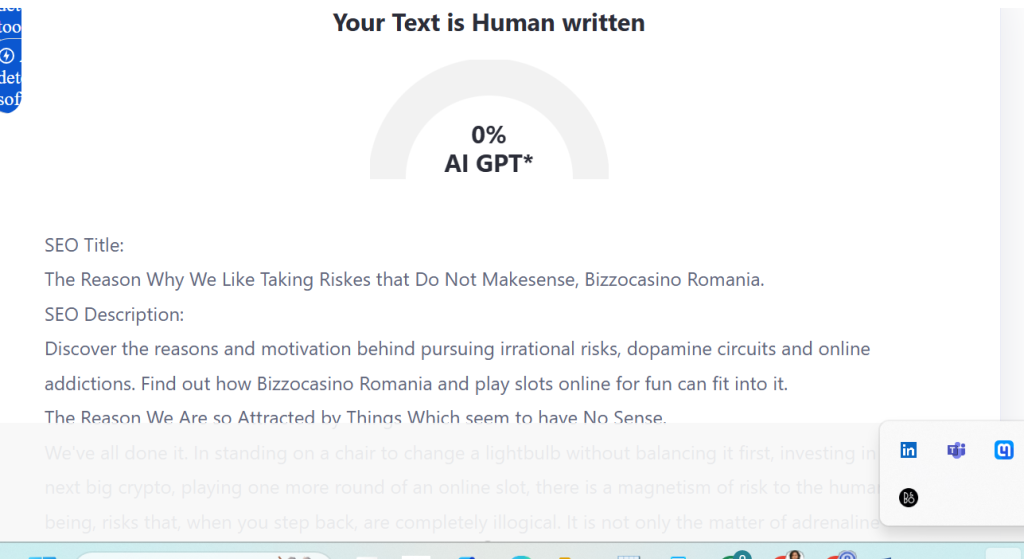
We’ve all done it. Standing on a chair to change a light bulb without balancing it first, investing in the next big cryptocurrency, or playing one more round of an online slot game reveals a magnetism of risk in human beings, risks that, upon reflection, appear completely illogical. It is not only a matter of adrenaline junkies or thrill-seekers. It is an inherent characteristic of the way our brains function.
The latest stage of this old appeal takes place on platforms such as Bizzocasino Romania, where players spin reels and pursue uncertain victories. But what’s behind the pull? Why do we continue to gamble on things that we know we are not supposed to?
Why Risk Feels Good: The Sensation of Danger.
Emotional Excitement vs. Rational Security.
In the process of pushing the boundaries, our brains begin firing in a manner that never stops or occurs when we are safe. The dopamine loop is in action: each time we expect any possible reward, a squirt of that feel-good neurotransmitter is released. Our rational mind is aware that the house always wins or that there is only a one-in-a-million chance of tragedy with cliff-jumping. But already the emotional part is grasping the helmet — or the spin button.
The Illusion of Control
People are fond of patterns, even though these patterns are absolutely random. In gambling, it is the number seven that is lucky. In the real world, it is going through the street when the light turns green. We trick ourselves into believing that ritual and repetition give us an advantage, which they do not. This delusion of control is the most persistent of cognitive biases — our brains cannot accept simple chance as mere chance.
The Psychology of the Risk Taker.
Dopamine and Reward Circuits.
What you actually have is a prediction machine. When it sees a potential reward, it discharges dopamine not upon receiving the reward, but upon anticipating it. It is one reason why being almost a winner is as thrilling as winning. Neuroscientists refer to this as the variable rewards system, and it is one of the reasons why people continue to take risks even after the logical cost-benefit analysis has given them the signal to cease.
The Evolutionary Psychology Take.
Evolution was sensible in terms of risk. Risk-taking, such as hunting dangerous game, making discoveries, and trying new foods, could sometimes mean the difference between survival and extinction—individuals who dared to push limits usually left behind their genes. Still today, our hunter-gatherer brain remains in use, utilizing the same circuitry, but this time it is applied to digital dangers, such as slot spins or speculative stocks.
Cognitive Biases in Play
Optimism bias: having an optimistic attitude that misfortunes occur to other people.
Availability heuristic: This is a heuristic that overestimates the likelihood of dramatic wins, as they are easier to remember.
Reinforcement learning: we receive a reward after engaging in a behaviour occasionally, so we continue to engage in that behaviour, regardless of the infrequency of the reward.
In a nutshell, our rational brain often lags, merely catching up with our primitive neural wiring.
Digital Environments Digital environments
The Emergence of the Online Gambling Sites.
The digital spaces enhance risk-taking behaviours by their availability, immersive, and instant nature. Sites such as Bizzocasino Romania are designed with colourful aesthetics, near-miss effects, and loops of instant gratification. It has nothing to do with deception–just with the same neural pathways that historically paid off berry pickers and sabre hunters.
Online Slots Play vs. Real Money Play.
Interestingly, when individuals play slots online as a form of entertainment, without any profit in mind, the brain still responds as though a bet is involved. The expectation of a possible occurrence is sufficient to trigger the dopamine loop. That is why cyber risks are so immersive: they provide an illusion of danger and a reward, except for the lion hunt.
Real-life experience with digital risk-taking.
Social Media and Viral Dares
It is also the wiring that keeps participants entertained in variable reward games, though, that drives risky online habits, such as posting viral opinions that everyone is talking about, engaging in viral challenges, or seeking likes. This is not a financial risk, but a reputational one. The reward circuitry, however, is very similar.
Microtransactions, Esports, Gaming.
Gambling is based on the same psychological mechanisms as high-stakes tournaments, loot boxes, and microtransactions. Players are often stuck in decision fatigue, the illusion of control, and intermittent reinforcement. When you take off the surface, the behavioural patterns are almost the same.
The Irrational Risk Remains Triumphant (Expert Assessment).
Psychologists tend to emphasize that risk is not necessarily bad — it is just out of place in the present day. Risk-taking was logical in evolutionary terms. Now, however, our cognitive biases are influencing digital spaces that are designed to maximise engagement. As George Ainslie, a behavioural economist, has observed, risk is not a matter of calculation; it is a matter of emotion.
This is why, despite our awareness of the odds, we take irrational risks: since our brains are constructed not so much like accountants as like thrill-seeking narrators.
Table: The Rewarding Nature of Irrational Risks.
| Factor | Scientific Basis | Example in Digital World |
| Dopamine reward system | Anticipation of uncertainty | Winning in Bizzocasino Romania slots |
| Illusion of control | Cognitive bias | Believing skill affects slot outcomes |
| Near-miss effect | Brain treats “almost wins” as wins | Free spins when you play slots online for fun |
| Social reinforcement | Social validation mechanisms | Posting risky viral content online |
| Evolutionary roots | Risk meant survival advantage | Taking chances in esports or gaming |

